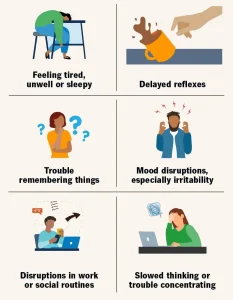Overview
Diagnosis
Diagnosing insomnia usually starts with a review of symptoms, sleep patterns and overall health. A healthcare professional may perform a physical exam to look for medical conditions that could be contributing to poor sleep. In some cases, blood tests are done to check for issues such as thyroid disorders that may interfere with sleep.
A detailed review of sleep habits is often included. You may be asked to complete questionnaires that show your sleep-wake patterns and daytime sleepiness. Keeping a sleep diary for a couple of weeks can also help identify routines, triggers and patterns that affect sleep quality.
If the cause of insomnia is unclear or there are signs of another sleep disorder such as sleep apnea or restless legs syndrome, a sleep study may be recommended. During a sleep study performed in a sleep center, several body functions are monitored, including brain waves, breathing, heart rate, body movements and eye movements.
Treatment
Managing insomnia often begins with improving sleep habits and addressing underlying issues such as stress, medical conditions or medications. If these steps are not effective, cognitive behavioral therapy or medicines may be recommended.
Cognitive Behavioral Therapy for Insomnia
Cognitive behavioral therapy for insomnia helps change negative thoughts and behaviors that disrupt sleep. It is often the first recommended treatment and can be as effective as medication.
Strategies used in therapy may include:
-
Stimulus control therapy to establish consistent sleep and wake times, limit naps and reserve the bed only for sleep and sex
-
Relaxation techniques such as breathing exercises, biofeedback and progressive muscle relaxation
-
Sleep restriction to reduce time in bed and build stronger sleep drive
-
Remaining passively awake, also known as paradoxical intention, to reduce anxiety about falling asleep
-
Light therapy to help adjust the internal body clock when sleep timing is off
Additional advice from healthcare professionals may include improvements in lifestyle habits and changes in the sleep environment to support better sleep.
Prescription Medicines
Prescription sleep medicines may help with falling asleep, staying asleep or both. They are generally used for short periods, although some options are approved for longer-term use. Treatment decisions consider risks, benefits and potential side effects.
Medicines used to help people fall asleep include:
-
Eszopiclone
-
Ramelteon
-
Temazepam
-
Triazolam
-
Zaleplon
-
Zolpidem tartrate
Medicines that may help with staying asleep or waking too early include:
-
Doxepin hydrochloride
-
Eszopiclone
-
Suvorexant
-
Temazepam
-
Zolpidem tartrate
These medicines can cause side effects such as daytime drowsiness and may be habit-forming. It is important to discuss risks and proper use with a healthcare professional.
Sleep Aids Available Without a Prescription
Over-the-counter sleep aids often contain antihistamines that cause drowsiness. These are not recommended for regular use. Side effects may include daytime sleepiness, dizziness, confusion and difficulty urinating, especially in older adults. Always talk to a healthcare professional before using non-prescription sleep aids.
Advertisement

